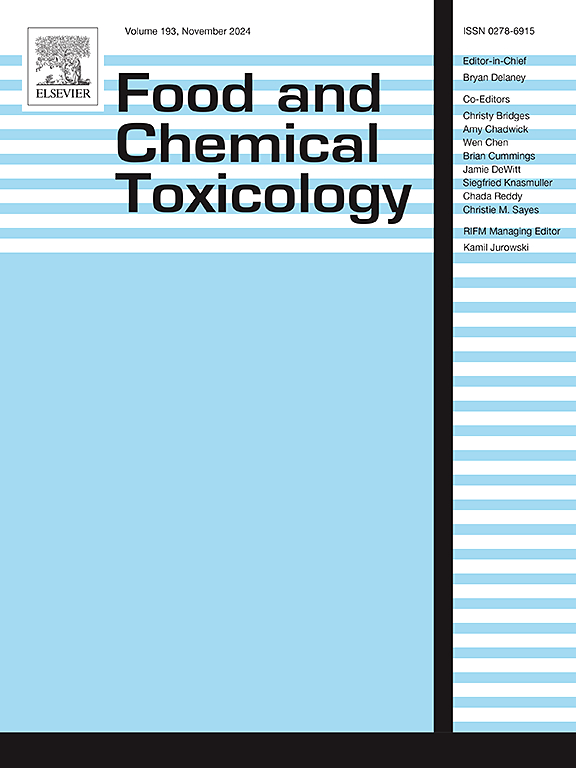Curcumin modulates the PTEN/PI3K/AKT pathway to alleviate inflammation and oxidative stress in PM2.5-Induced chronic obstructive pulmonary disease
IF 3.9
3区 医学
Q2 FOOD SCIENCE & TECHNOLOGY
引用次数: 0
Abstract
Ambient fine particulate matter (PM2.5) contributes to the onset and escalation of chronic obstructive pulmonary disease (COPD) through the induction of inflammatory reactions and oxidative stress. Curcumin is a natural polyphenolic compound renowned for the potent antioxidant and anti-inflammatory properties. This research utilized a PM2.5-induced COPD mouse model and BEAS-2B cell line to explore the protective mechanisms of curcumin. The results showed that PM2.5 impaired pulmonary function, exacerbated airway inflammation, and caused structural damage to lung tissue. Elevated levels of inflammatory cytokines such as IL-6, IL-1β, and TNF-α, increased malondialdehyde, and reduced activities of antioxidant enzymes catalase and superoxide dismutase were observed in both mice and BEAS-2B cell line. PM2.5 exposure also suppressed PTEN expression and activated PI3K/AKT signal, and the downstream molecule NF-κB was activated and FoxO1 activity was inhibited. PTEN overexpression partially reversed PM2.5-induced inflammation and oxidative stress in vitro. Curcumin enhanced PTEN expression, inhibited PI3K/AKT and NF-κB activation, and restored FoxO1 activity, alleviating airway inflammation and oxidative stress, while PTEN inhibition attenuated the ameliorating effects of curcumin in vitro and in vivo. In summary, PM2.5 exposure induces COPD inflammation and oxidative stress by disrupting PTEN/PI3K/AKT signaling and curcumin significantly alleviates these effects partially through PTEN/PI3K/AKT signal.
姜黄素调节PTEN/PI3K/AKT通路,减轻PM2.5诱导的慢性阻塞性肺病的炎症和氧化应激反应
环境细颗粒物(PM2.5)通过诱导炎症反应和氧化应激,促进慢性阻塞性肺疾病(COPD)的发生和升级。姜黄素是一种天然多酚类化合物,以其有效的抗氧化和抗炎特性而闻名。本研究利用pm2.5诱导COPD小鼠模型和BEAS-2B细胞系,探讨姜黄素的保护机制。结果表明,PM2.5损害肺功能,加重气道炎症,造成肺组织结构性损伤。在小鼠和BEAS-2B细胞系中均观察到炎症细胞因子IL-6、IL-1β和TNF-α水平升高,丙二醛水平升高,抗氧化酶过氧化氢酶和超氧化物歧化酶活性降低。PM2.5暴露还抑制PTEN表达,激活PI3K/AKT信号,激活下游分子NF-κB,抑制FoxO1活性。PTEN过表达部分逆转pm2.5诱导的体外炎症和氧化应激。姜黄素增强PTEN表达,抑制PI3K/AKT和NF-κB活化,恢复FoxO1活性,减轻气道炎症和氧化应激,而抑制PTEN在体外和体内均减弱了姜黄素的改善作用。综上所述,PM2.5暴露通过破坏PTEN/PI3K/AKT信号通路诱导COPD炎症和氧化应激,姜黄素部分通过PTEN/PI3K/AKT信号通路显著缓解上述作用。
本文章由计算机程序翻译,如有差异,请以英文原文为准。
求助全文
约1分钟内获得全文
求助全文
来源期刊

Food and Chemical Toxicology
工程技术-毒理学
CiteScore
10.90
自引率
4.70%
发文量
651
审稿时长
31 days
期刊介绍:
Food and Chemical Toxicology (FCT), an internationally renowned journal, that publishes original research articles and reviews on toxic effects, in animals and humans, of natural or synthetic chemicals occurring in the human environment with particular emphasis on food, drugs, and chemicals, including agricultural and industrial safety, and consumer product safety. Areas such as safety evaluation of novel foods and ingredients, biotechnologically-derived products, and nanomaterials are included in the scope of the journal. FCT also encourages submission of papers on inter-relationships between nutrition and toxicology and on in vitro techniques, particularly those fostering the 3 Rs.
The principal aim of the journal is to publish high impact, scholarly work and to serve as a multidisciplinary forum for research in toxicology. Papers submitted will be judged on the basis of scientific originality and contribution to the field, quality and subject matter. Studies should address at least one of the following:
-Adverse physiological/biochemical, or pathological changes induced by specific defined substances
-New techniques for assessing potential toxicity, including molecular biology
-Mechanisms underlying toxic phenomena
-Toxicological examinations of specific chemicals or consumer products, both those showing adverse effects and those demonstrating safety, that meet current standards of scientific acceptability.
Authors must clearly and briefly identify what novel toxic effect (s) or toxic mechanism (s) of the chemical are being reported and what their significance is in the abstract. Furthermore, sufficient doses should be included in order to provide information on NOAEL/LOAEL values.
 求助内容:
求助内容: 应助结果提醒方式:
应助结果提醒方式:


